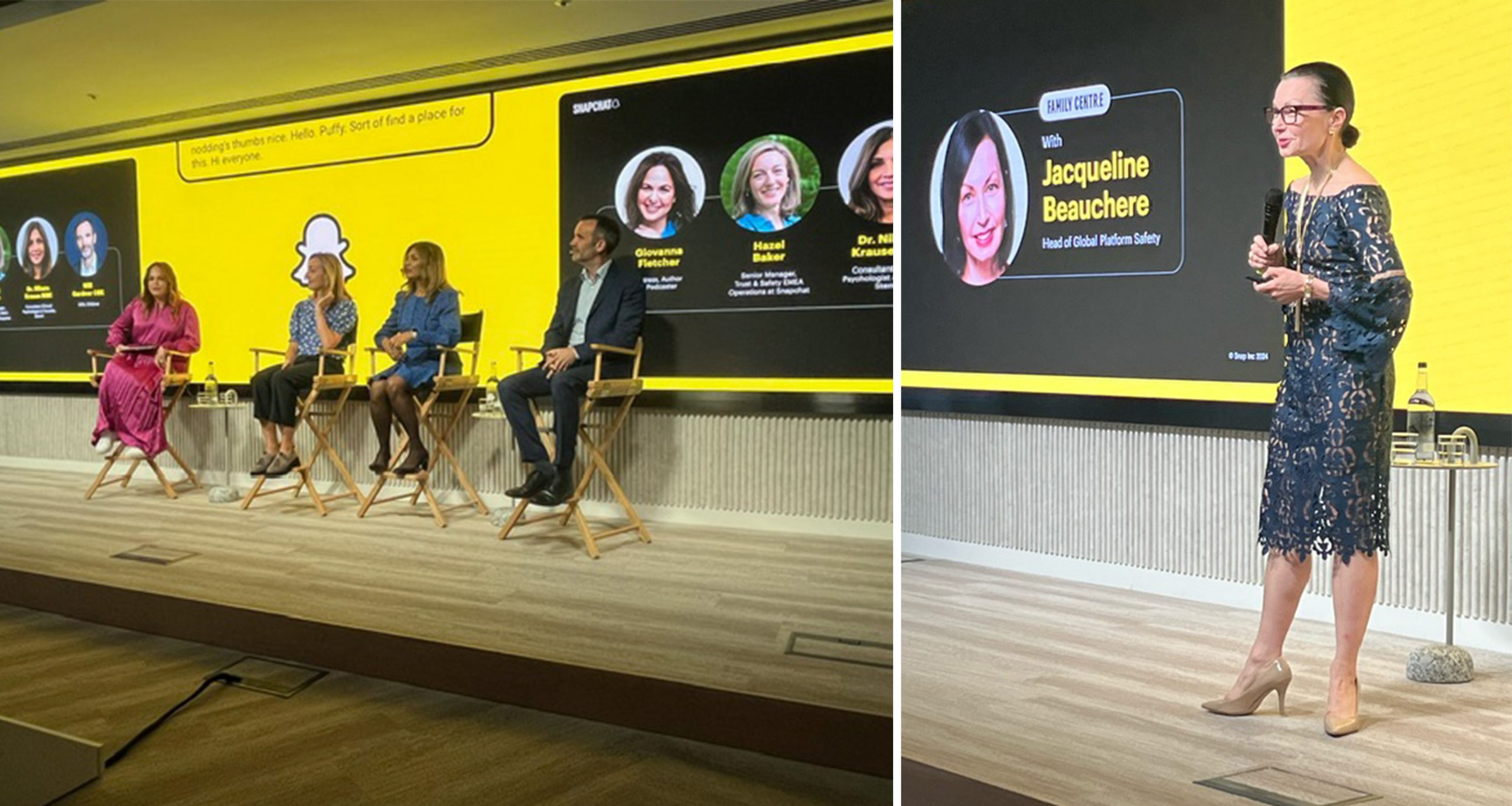Advice
Snapchat Internet Safety | Children And The Internet


Parenting / 16 September, 2024 / Charlotte Pearl
At a recent event hosted by Snapchat and Childnet, My Baba reporter Charlotte Pearl attended to explore the vital topic of internet safety for children. With growing concerns around online risks, this event focused on equipping parents and caregivers with the tools and knowledge to ensure safer digital experiences for their kids.
I recently attended a very insightful event at Snapchat’s London headquarters, hosted in association with Childnet (a UK charity dedicated to making the internet a safer place for children). Ironically, my day began with me telling my son off for being on his phone whilst eating breakfast!
Snapchat’s headquarters was everything you’d expect: beautifully designed, with a delicious and ‘screen-worthy’ breakfast spread! But the real treat of the day was the informative panel discussion featuring Will Gardener OBE: CEO Childnet, Giovanna Fletcher: actress, author, podcaster, Hazel Baker: Senior Manager, Trust and Safety EMEA Operations at Snapchat, and Dr. Nihara Krause MBE: Consultant Clinical Psychologist and Founder Stem4.
Social Media: Do You Know the Platforms Your Children Are Using?
One of the most striking insights from the event was something I realized I’m guilty of as a parent: fearing the unknown. It’s easy to forget that our children’s world is vastly different from the one we grew up in. For many parents, the knee-jerk reaction to online activities is often to limit or punish, as it feels so foreign to us. But instead of simply withdrawing these platforms from our children, we should focus on learning about them. Social media is a huge part of their world, and being genuinely interested in it helps us guide them in a healthier way.
Understanding Online Habits with Non-Judgmental Dialogue
Dr. Krause emphasized that children crave parental support and approval. If they sense disappointment or disapproval when they share their online experiences, they may shut us out. This is risky, as it prevents us from monitoring and assisting them in navigating the digital world safely. Instead, we should strive to understand their online habits and create open, non-judgmental dialogue.
Jacqueline Beauchere: Snapchat Head of Global Platform Safety
Jacqueline Beauchere talked about a brilliant Snapchat tool called Family Center that allows parents to monitor their child’s contacts without reading the actual chats. This feature aims to strike a balance between privacy and safety, providing parents with a way to stay informed about their child’s online interactions. However, as I found out from talking to my 16-year-old, children might resist this kind of oversight if it’s introduced too late. My advice? Set up Family Center right from the start, as soon as they’re allowed on social media at the appropriate age.
Another point raised during the panel was how our children model their behavior on us. If we’re constantly glued to our screens, we can’t expect them to do any differently. Will Gardner advised that as parents, we should set shared boundaries – for both us and our children – around screen time and online interactions. Boundaries work best when established from the beginning, providing parameters that both children and adults need to navigate the digital world safely.
Be Curious. Not Furious: Keep The Conversation Going
What’s scary and unfamiliar for us is everyday life for our children but as Will Gardner said, it’s better to ‘Be curious. Not furious’. The best way to start a conversation about online behavior is through natural, casual discussions. For example, talk to them while cooking dinner or doing another shared activity so it doesn’t feel like an interrogation. Being fearful makes us defensive, and it can shut us out of their lives. The key takeaway? Empower ourselves by getting to know the online world with our children through lots of small conversations. It’s about managing risk exposure, not driving them to do the opposite of what we say by creating “forbidden fruit.”
Setting Boundaries from the Start
Age restrictions on platforms exist for a reason. Children should be informed and empowered at the right age to understand and navigate these risks. Teens today face a completely different set of challenges connected with their online presence, and it’s our job to help them through it.
While monitoring tools like Snapchat’s Family Center provide a way to keep track of who our children interact with, they aren’t the complete solution. As I discovered in my chat with my teen, they may resist this type of oversight if not introduced early on. The bottom line is that children and adults alike need clear boundaries and guidelines. Creating an open dialogue and setting these parameters from the start can make a world of difference in helping our children navigate the digital world safely and confidently.
Article by Charlotte Pearl

READ NEXT
Mum On The Run: Look For September
10 Bedside Tables For Kids
-

 Destination8 months ago
Destination8 months agoSingapore Airlines CEO set to join board of Air India, BA News, BA
-

 Breaking News10 months ago
Breaking News10 months agoCroatia to reintroduce compulsory military draft as regional tensions soar
-

 Gadgets3 months ago
Gadgets3 months agoSupernatural Season 16 Revival News, Cast, Plot and Release Date
-

 Tech News12 months ago
Tech News12 months agoBangladeshi police agents accused of selling citizens’ personal information on Telegram
-

 Productivity11 months ago
Productivity11 months agoHow Your Contact Center Can Become A Customer Engagement Center
-

 Gadgets3 weeks ago
Gadgets3 weeks agoFallout Season 2 Potential Release Date, Cast, Plot and News
-

 Breaking News10 months ago
Breaking News10 months agoBangladesh crisis: Refaat Ahmed sworn in as Bangladesh’s new chief justice
-

 Toys12 months ago
Toys12 months ago15 of the Best Trike & Tricycles Mums Recommend























